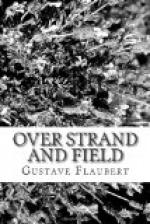Thus does the mind people and animate this infinity, of which it tires so soon, in order that it may appear less vast. One cannot think of the desert without its caravans, of the ocean without its ships, of the bowels of the earth without evoking the treasures that they are supposed to conceal.
We returned to Conquet by way of the cliff. The breakers were dashing against its foot. Driven by a sea-breeze, they would come rushing in, strike the rocks and cover them with rippling sheets of water. Half an hour later, in a char-a-banc drawn by two sturdy little horses, we reached Brest, which we left with pleasure two days afterwards. When you leave the coast and approach the Channel, the country undergoes a marked change; it becomes less wild, less Celtic; the dolmens become scarcer, the flats diminish as the wheat fields grow more numerous, and, little by little, one reaches the fertile land of Leon, which is, as M. Pitre-Chevalier has gracefully put it, “the Attica of Brittany.”
Landerneau is a place where there is an elm-tree promenade, and where we saw a frightened dog running through the streets with a pan attached to its tail.
In order to go to the Chateau de la Joyeuse-Garde, one must first follow the banks of the Eilorn and then walk through a forest, in a hollow where few persons go. Sometimes, when the underwood thins out and meadows appear between the branches, one catches sight of a boat sailing up the river.
Our guide preceded us at quite a distance. Alone together we trod the good old earth, flecked with bunches of purple heather and fallen leaves. The air was perfumed with the breath of violets and strawberries; slender ferns spread over the trunks of the trees. It was warm; even the moss was hot. A cuckoo, hidden in the foliage, now and then gave out its long cry, and gnats buzzed in the glades. We walked on with a feeling of inward peace, and let our conversation touch on many subjects; we spoke of sounds and colours, of the masters and their works, and of the joys of the mind; we thought of different writings, of familiar pictures and poses; we recited aloud some wonderful verses, the beauty of which thrilled us so that we repeated the rhythm again and again, accentuating the words and cadencing them so that they were almost sung. Foreign landscapes and splendid figures rose before our mind’s eye, and we dwelt with rapture on soft Asiatic nights with the moon shining on the cupolas; or our admiration was aroused by some sonorous name; or we delighted in the artlessness of some sentence standing out in relief in an ancient book.
Stretched out in the courtyard of Joyeuse-Garde, near the filled-up subterranean vaults, beneath the semi-circle of its unique ivy-covered arcade, we talked of Shakespeare and wondered whether the stars were inhabited.
Then we started off again, having given but a hasty glance at the crumbling home of good old Lancelot, the one a fairy stole from his mother and kept in a shining palace at the bottom of a lake. The dwarfs have disappeared, the drawbridge has flown away, and lizards now crawl where formerly the entrancing Genevieve dreamed of her lover gone to fight the giants in Trebizonde.




